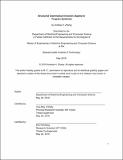Structured Grammatical Evolution applied to program synthesis
Author(s)
Zhang, Andrew H.,M. Eng.Massachusetts Institute of Technology.
Download1127291873-MIT.pdf (732.2Kb)
Alternative title
SGE applied to program synthesis
Other Contributors
Massachusetts Institute of Technology. Department of Electrical Engineering and Computer Science.
Advisor
Una-May O'Reilly.
Terms of use
Metadata
Show full item recordAbstract
Grammatical Evolution (GE) is an evolutionary algorithm that is gaining popularity due to its ability to solve problems where it would be impossible to explore every solution within a realistic time. Structured Grammatical Evolution (SGE) was developed to overcome some of the shortcomings of GE, such as locality issues as well as wrapping around the genotype to complete the phenotype. In this paper, we apply SGE to program synthesis, where the computer must generate code to solve algorithmic problems. SGE was improved upon, because the current definition of SGE does not work. Given that the solution space is very large for possible codes, we aim to improve the efficiency of GE in converging to the correct solution. We present a method in which to remove cycles from a grammar for SGE, to be able to make sure that a genotype matches to a phenotype with reusing parts of the genotype, and analyze results to shed insight on future improvements.
Description
This electronic version was submitted by the student author. The certified thesis is available in the Institute Archives and Special Collections. Thesis: M. Eng., Massachusetts Institute of Technology, Department of Electrical Engineering and Computer Science, 2019 Cataloged from student-submitted PDF version of thesis. Includes bibliographical references (page 27).
Date issued
2019Department
Massachusetts Institute of Technology. Department of Electrical Engineering and Computer SciencePublisher
Massachusetts Institute of Technology
Keywords
Electrical Engineering and Computer Science.